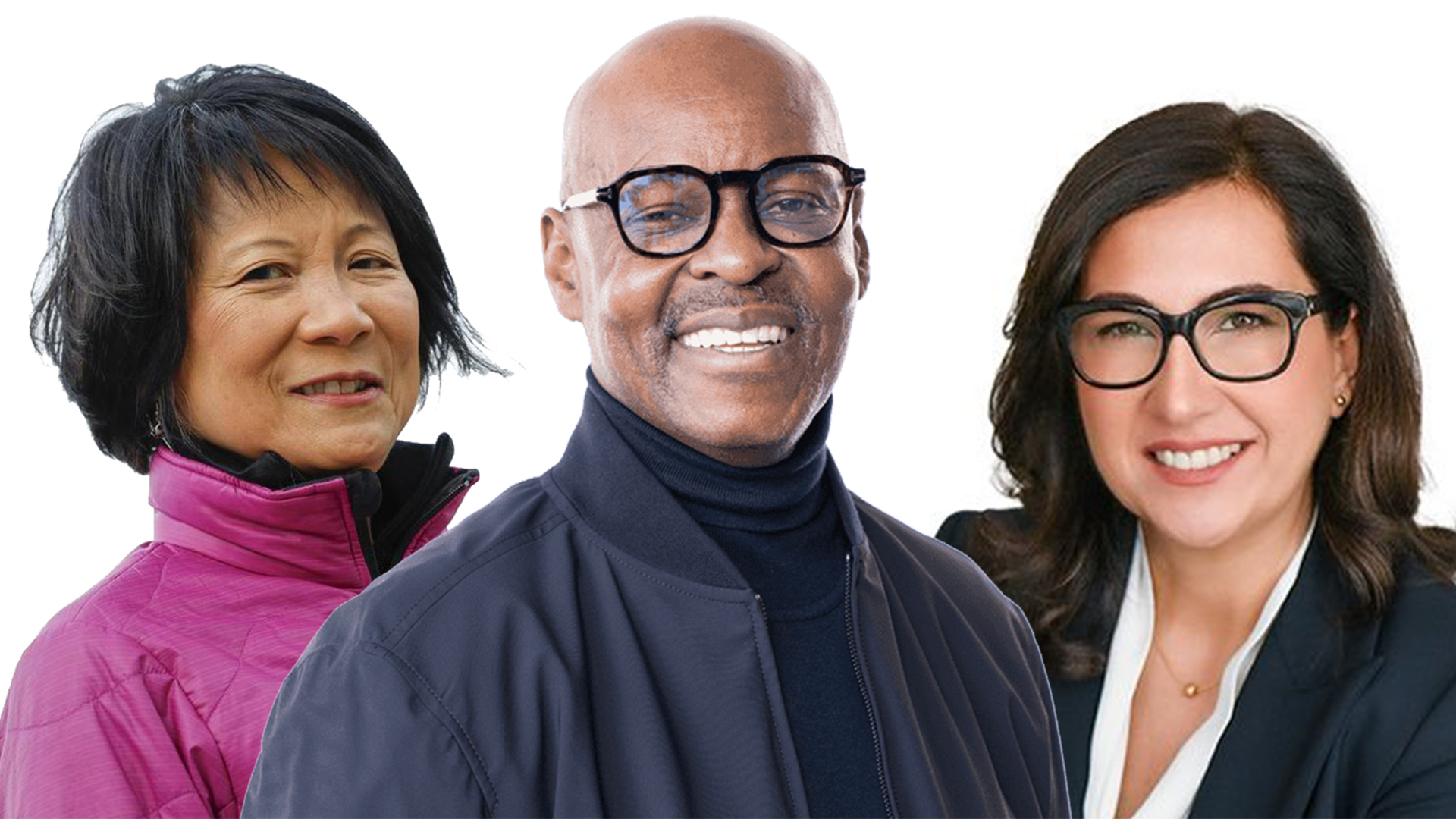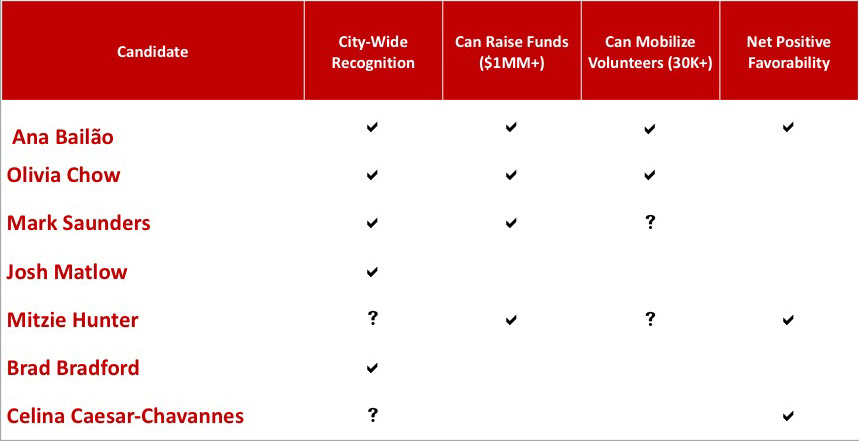
As nominations closed Friday in the by-election to choose Toronto’s next mayor, there were 102 registered candidates. But of this historically long list, only seven real candidates matter.
Unless you’re the son, daughter, father, mother, brother or sister of one of the also-ran candidates, there are only 14 you’ve likely ever heard of. Just seven of these are, in any way, credible options. Which is actually pretty impressive, considering there was only one credible option in the general election for mayor last year.
Here’s how I organize the recognizable(ish) contenders in three tiers.
Three (maybe four) things matter in the mayor’s race
To win the Toronto mayor’s race, you need three things: city-wide recognition, the ability to raise at least $1 million, and the ability to mobilize around 30,000 volunteers. It also helps to be viewed more favourably than not, so call it four factors.
City-Wide Recognition. Most of the seven have city-wide recognition, particularly Mark Saunders and Olivia Chow. Bailao is recognizable in most Toronto neighbourhoods owing to the higher profile she had as a former deputy mayor to John Tory. Matlow and Bradford have excellent recognition in their own city council wards, but are lesser known in the rest of the city. Matlow benefits a little from the higher profile he garnered as Council’s bad boy. Like the two councillors, Hunter and Caesar-Chavannes are known to their constituents, but I’m not sure how well they’ll be recognized by voters city-wide.
Fundraising. Ana Bailao has enough backroom support to raise funds. She’s not an ideologue and has been politically pliable, so many financiers (including the city employees’ unions) may think she’s likely to be a friendly ear for their policy objectives. Olivia Chow has the NDP machine behind her with its very deep pockets. Saunders, with the blessing of Premier Doug Ford and his Big Blue machine will have no problem spending as much as needed. It remains to be seen if Hunter can tap into depleted Liberal Party financial backers. None of the others have any obvious financial backing.
Volunteer Support. Olivia Chow’s NDP connections absolutely give her the ability to mobilize and organize the 30,000 or so volunteers required to distribute literature and canvas doorsteps across the entire city, and to fully staff the hundreds of polling stations that will be set up on election day. Ana Bailao has a number of successful political organizers on her staff who probably can mobilize sufficient volunteers to execute a professional campaign. If Mark Saunders can tap into the PC Party of Ontario volunteer base, he should be able to put enough feet on the ground to mount an effective campaign. The rest of the seven have, at best, local organizations that can generate a few hundreds or a thousand or so volunteers. Not enough to work effectively city-wide.
Favourability. Although Chow is known broadly across the city, she is not particularly well-liked outside her NDP base – and, even there, she’s old news. She’s never been a good campaigner and this is evidenced by the fact we rarely see her. Her campaign strategy, thus far, is “keep her away from voters.” Saunders, though well-known from his time as the city’s police chief, is not particularly well-respected or liked outside the core “law and order conservative” base who may show up to support anybody who ever wore a badge. But, even there, he’s not particularly well-respected as he was not a very popular police chief, nor is he credited for doing a very good job.
Josh Matlow and Brad Bradford have some support in their own constituencies, but Matlow is not well-liked anywhere else by anyone else and Bradford’s favourability is, at best, neutral. Caesar-Chavannes and Hunter may have slightly favourable ratings, assuming you aren’t a Liberal distraught at Caesar-Chavannes’s clash with Justin Trudeau or anyone who recalls Hunter’s poor performance as a Toronto Community Housing Corporation official.
That leaves Ana Bailao as a politician not particularly hated by anyone for anything. Most of her duties as an honorary deputy mayor to John Tory had her showing up on happy ceremonial occasions and championing affordable housing without actually being held accountable to deliver any, so her favourables are probably pretty good.
The top tier candidates are Chow, Bailao and maybe Saunders
This leaves us with a top tier of three candidates: Olivia Chow, Ana Bailao and (maybe) Mark Saunders. Of these, only Bailao has all the critical factors required to win a mayoral campaign – and the competencies required to do so.
Mark Saunders had zero strengths as a campaigner for PC party in the most recent provincial election. Chow is a notoriously bad campaigner. Bailao seems willing, ready and able to take on the gruelling campaign trail and win.
I’d give Bailao the advantage in this race.
Tier 2 consists of the other four candidates in the top seven: Josh Matlow, Brad Bradford, Mitzie Hunter and Celina Caesar-Chavannes.
Tier 3 is everyone else.
Who do you think will be Toronto’s next mayor?




